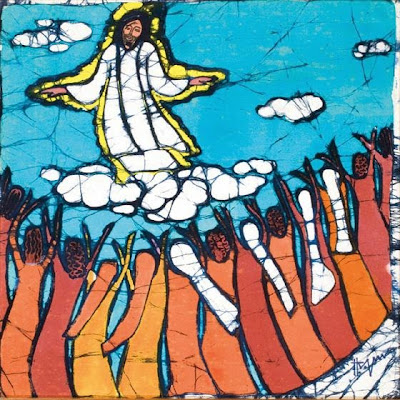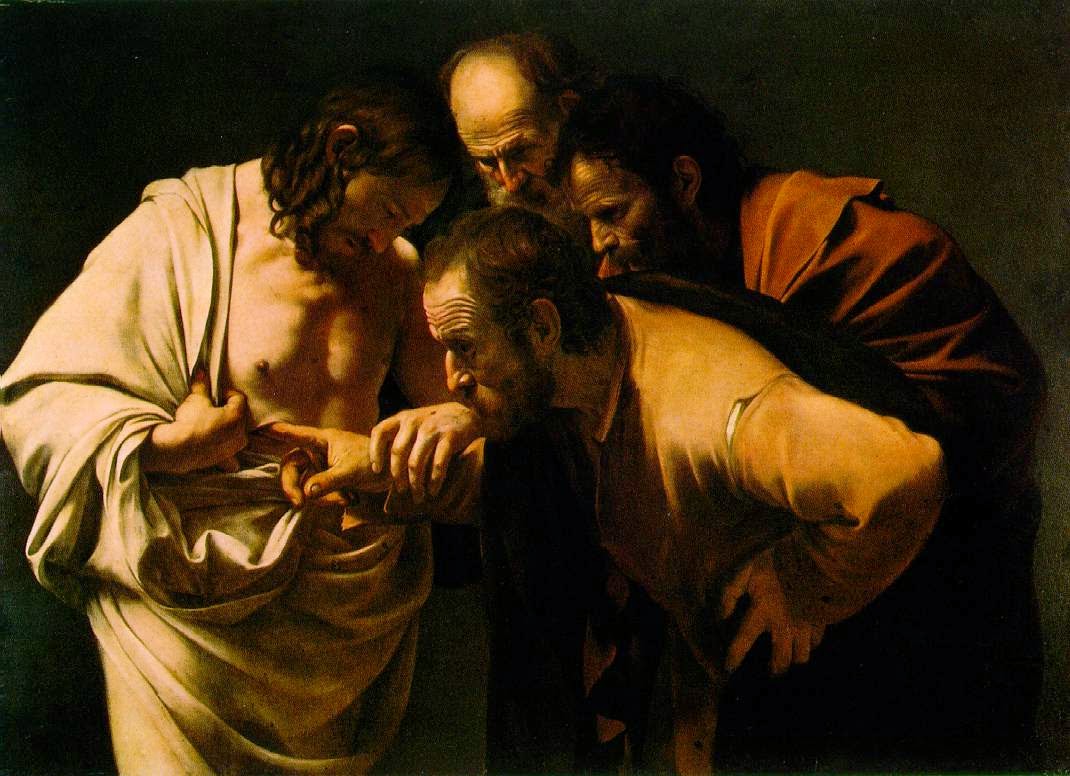Acts 2:1-21; John 15:26-27; 16:4b -15
May 24, 2015
© 2015
 |
| The Day of Pentecost Mark Hewitt |
This is my last sermon as I conclude my interim ministry with Highlands Christian Church in Dallas. I hope to have another interim pastorate, but as yet do not have one in place. Thus, this will be the last sermon script posted here until I am serving another congregation. I will post notice of that on Facebook and Twitter when the time comes. Thanks to all who have read and encouraged my ministry.
In Jesus’ farewell message to his disciples
he warned them they would be hated (John 15:18-26) but promised them the coming
of the Holy Spirit in John 15:26-27; 16:4b-15. For me this brought together
Pentecost Sunday with my last Sunday as your interim pastor. Listen to Jesus’
farewell message to his disciples to recognize and follow the Holy Spirit’s
whispers.
“When the Advocate
comes, whom I will send to you from the Father, the Spirit of truth who comes
from the Father, he will testify on my behalf. 27You also are to testify because
you have been with me from the beginning. …
I did not say these things to you from the beginning, because I was with
you. 5But now I am going to him who
sent me; yet none of you asks me, ‘Where are you going?’ 6But
because I have said these things to you, sorrow has filled your hearts. 7Nevertheless I tell you the
truth: it is to your advantage that I go away, for if I do not go away, the
Advocate will not come to you; but if I go, I will send him to you. 8And
when he comes, he will prove the world wrong about sin and righteousness and
judgment: 9about sin, because they do not
believe in me; 10about righteousness, because I
am going to the Father and you will see me no longer; 11about
judgment, because the ruler of this world has been condemned. 12“I
still have many things to say to you, but you cannot bear them now. 13When the Spirit of truth comes,
he will guide you into all the truth; for he will not speak on his own, but
will speak whatever he hears, and he will declare to you the things that are to
come. 14He will glorify me, because he
will take what is mine and declare it to you.
15All that the Father has is
mine. For this reason I said that he will take what is mine and declare it to
you.
To whom are you listening when the Spirit whispers?
Jesus called the Spirit “the Advocate” in
15:26; 16:7. The Greek word is Paraclete
which means defense attorney or legal counsel. Jesus envisioned a courtroom in
which accusations would be hurled against his followers, and the Holy Spirit
stands by them to defend them.
The Holy Spirit is the opposite of the
prosecuting attorney called hasatan
in Job 1:6-2:7 and Zechariah 3:1-2, from which the New Testament gets the name
Satan, whom Revelation 12:10 calls the accuser.
Jesus also called the Holy Spirit the Spirit
of truth in 15:26; 16:13. The Spirit is the one who gives true testimony on
behalf of Jesus and us when we are accused.
For what are you listening when the Spirit
whispers?
Jesus said the Spirit will prove the world
wrong about sin, righteousness and judgment (16:8-11). When the accusations
seem too much to bear, the Spirit becomes judge of the ruler of this world,
handling the condemnation of our accuser. The Spirit whispers truth freeing us
from shame.
The Spirit testifies on behalf (15:26) of and
glorifies (16:14) Jesus, so when affirming Jesus wells up in you, recognize as
the Spirit’s whisper and let it out knowing the Spirit speaks in and through
you.
Jesus said that all the Father has is his,
and the Spirit declares all that belongs to Jesus to us. (16:14-15) Thus the
Spirit whispers that you have complete and free access to all of the spiritual
resources of the Father in Jesus.
So, in the cacophony of not just a noisy
world but an often noisy church, how do you discern the Spirit’s whispers?
Scripture is the starting place, not just
informational knowledge but absorbing it into your whole being as your body
absorbs nutrition from food. To change the image, keep filling the reservoir of
your heart with Scripture so the Spirit can bring relevant truth to the surface
at the exact moment you know your resources are inadequate.
Though Jesus said the Spirit “speaks,” I have
intentionally said the Spirit whispers. Noisy, cluttered minds tend to drown
out the Spirit’s whispers. Even our prayers can be chatter. We don’t let God
get a word in edgewise. One thing to pray for is to recognize the Spirit’s
whispers and then be quiet long enough to listen for them.
The Pentecost story in Acts 2 says that they
were all filled with the Holy
Spirit, not each one. Yes, we each
have the Spirit indwelling us, but it is together as we listen to each other
that we recognize the voice of the Spirit in someone else’s words. When the
Spirit speaks to and through the church, all sense a confirmation of having
heard from God. I know the Search and Call Committee experienced that when they
discerned God called Jonathan as the next pastor for Highlands Christian
Church.
Though his disciples couldn’t grasp it at the
time, Jesus assured them that it was to their advantage for him to go away so
that the Holy Spirit could come. I am certainly not Jesus, nor is Jonathan the
Holy Spirit, but it is definitely to your advantage for me to go away and
Jonathan to come to you.
As the Lone Ranger said to Tonto at the end
of every episode, and Mary Poppins said when she left the Banks family, “My
work here is done now.” Between what you have accomplished on this interim
journey and with Jonathan starting on as your pastor this week, mixing in some Star Trek, you are poised to follow the
Holy Spirit into a mission frontier to explore new ways to bring the Gospel of
Jesus to new people, to boldly go where Highlands Christian Church has never
gone before.
During these last 9 months, I’d like to think
God has conveyed some wisdom, experience, insight and stability to you through Candy
and me. To boldly go where God is leading you, it is to your advantage for God
to send you energy and imagination through Jonathan.
I have mentioned before how impressed Candy
and I have been with the spiritual tenor of this congregation. Just as the Holy
Spirit came to propel the early church into their mission, recognizing and
following the whispers of the Holy Spirit is essential for you to boldly go
into the mission frontier God is opening ahead of you. It doesn’t happen
magically with the right pastor or the right programs, it happens when you
listen to the Spirit’s whispers together. If what you think you are hearing is
really from the Spirit others will confirm it. And if the Spirit is leading you
into unfamiliar territory, the Spirit will also equip you with all the
know-how, energy, ideas, resources, courage and people you need.
















